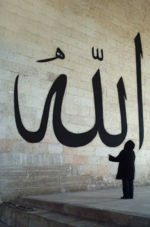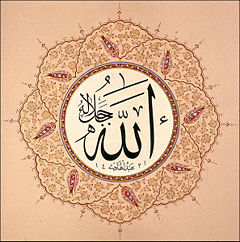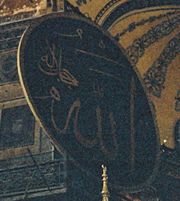Allah
2008/9 Schools Wikipedia Selection. Related subjects: Divinities
| Arabic |
| الله |
| Transliteration |
| Allāh |
| Translation |
| God |
Allah (Arabic: الله, Allāh, IPA: [ʔalˤːɑːh] pronunciation ) is the standard Arabic word for "God". While the term is best known in the West for its use by Muslims as a reference to God, it is used by Arabic-speakers of all Abrahamic faiths, including Christians and Jews, in reference to "God". The term was also used by pagan Meccans as a reference to the creator-god, possibly the supreme deity in pre-Islamic Arabia.
The concepts associated with the term Allah (as a deity) differ among the traditions. In pre-Islamic Arabia amongst pagan Arabs, Allah was not the sole divinity, having associates and companions, sons and daughters, a concept strongly opposed by Islam. In Islam, Allah is the supreme and all-comprehensive divine name. All other divine names are believed to refer back to the one God. Allah is unique, the only God, transcendent creator of the universe and omnipotent. Arab Christians today, having no other word for 'God' than Allah, use terms such as Allāh al-Āb (الله الآب) "God the Father". There are both similarities and differences between the concept of God as portrayed in the Qur'an and the Hebrew Bible.
Unicode has a codepoint reserved for Allāh, ﷲ = U+FDF2. Many Arabic type fonts feature special ligatures for Allah.
Etymology
The term Allāh is most likely derived from a contraction of the Arabic article al- and ʾilāh "deity, god" to al-lāh meaning "the [sole] deity, God" (ho theos monos). Cognates of the name "Allāh" exist in other Semitic languages, including Hebrew and Aramaic. The corresponding Aramaic form is אֱלָהָא ˀĔlāhā in Biblical Aramaic and ܐܰܠܳܗܳܐ ˀAlâhâ or ˀĀlōho in Syriac.
The contraction of al- and ʾilāh in forming the term Allāh ("the god", masculine form) parallels the contraction of al- and ʾilāha in forming the term Allāt ("the goddess", feminine form).
Usage in Arabic
Pre-Islamic Arabia
In pre-Islamic Arabia, Allah was used by Meccans as a reference to the creator-god, possibly the supreme deity. Allah was not the sole divinity and the notion of the term may have been vague in the Meccan religion. Allah had associates and companions, whom pre-Islamic Arabs considered as subordinate deities. Meccans held that a kind of kinship existed between Allah and the jinn. Allah had sons and the local deities of al-ʿUzzā, Manāt and Allāt were his daughters. The Meccans possibly associated angels with Allah. Allah was invoked in times of distress. Muhammad's father name was ʿAbdallāh meaning the “servant of Allāh.”
Muslims
In Islam, Allah is the name of the nameless God, the pivot of the Muslim faith. "He is the only God, transcendent creator of the universe, and the judge of humankind." "He is unique (wahid) and inherently one (ahad), all-merciful and omnipotent." The Qur'an insists upon "the reality of Allah, His inaccessible mystery, His various names, and His actions on behalf of His creatures."

According to the tradition of Islam there are 99 Names of God (al-asma al-husna lit. meaning: "The best names") each of which evoke a distinct characteristic of Allah. All these names refer to Allah, the supreme and all-comprehensive divine name. Among the 99 names of God, the most famous and most frequent of these names are "the Merciful" (al-rahman) and "the Compassionate" (al-rahim).
Most Muslims use the untranslated Arabic phrase "insha' Allah" (meaning "God willing") after references to future events. Muslim discursive piety encourages beginning things with the invocation of "basmAllah".
Muslims are recommended to repeat phrases like "Subhan-Allah" (Holiness be to God), "Ahlamdo-Lillah" (Praise be to God), "La-il-la-ha-il-Allah" (There is no deity but God) and "Allah-o-Akbar" (God is great) as a devotional exercise of remembering God (zikr). In a Sufi practice known as zikr Allah (lit. remembrance of God), the Sufi repeats and contemplates on the name Allah or other divine names while controlling his or her breath.
Others
Arabic-speakers of all Abrahamic faiths, including Christians and Jews, use the word "Allah" to mean "God". The Christian Arabs of today have no other word for 'God' than 'Allah'. Arab Christians for example use terms Allāh al-ab (الله الآب) meaning God the father, Allāh al-ibn (الله الابن) mean God the son, and Allāh al-rūḥ al qudus (الله الروح القدس) meaning God the Holy Spirit (See God in Christianity for the Christian concept of God).
Arab Christians have used two forms of invocations that were affixed to the beginning of their written works. They adopted the Muslim basm-allah, and also created their own Trinitized basm-allah as early as the eight century CE. The Muslim basm-allah reads: "In the name of God, the Compassionate, the Merciful." The Trinitized basm-allah reads: "In the name of Father and the Son and the Holy Spirit, One God." The Syriac, Latin and Greek invocations do not have the words "One God" at the end. This addition was made to emphasize the monotheistic aspect of Trinitian belief and also to make it more palatable to Muslims.
According to Marshall Hodgson, it seems that in the pre-Islamic times, some Arab Christians made pilgrimage to the Kaaba, a pagan temple at that time, honoring Allah there as God the Creator.
Other usage
English and other European languages
The history of the word "Allāh" in English was probably influenced by the study of comparative religion in 19th century; for example, Thomas Carlyle (1840) sometimes used the term Allah but without any implication that Allah was anything different from God. However, Tor Andræ's biography of Muhammad (1934) always used the term Allah though he "allows that this is 'a conception of God', seems to imply that it is different from the Jewish and Christian conceptions." By this time Christians were also becoming accustomed to retaining the Hebrew term " Yahweh" untranslated (it was previously translated as 'the Lord').
Languages which may not commonly use the term Allah to denote a deity may still contain popular expressions which use the word. For example, because of the centuries long Muslim presence in the Iberian Peninsula, the word ojalá (Arabic: إن شاء الله) today exist in the Spanish language, borrowed from Arabic. This phrase literally means "God willing" (in the sense of "I hope so").
Some Muslims leave the name "Allāh" untranslated in English. Sometimes this comes from a zeal for the Arabic text of the Qur'an and sometimes with a more or less conscious implication that the God that Jews and Christians worship is not completely true in its details. Conversely, the usage of the term Allah by English speaking non-Muslims in reference to the God in Islam, Marshall G. S. Hodgson says, can imply that Muslims are worshiping a mythical god named 'Allah' rather than God, the creator. This usage is therefore appropriate, Hodgson says, only for those who are prepared to accept its theological implications.
Comparative religion
Some western scholars have suggested that Muhammad used the term Allah in addressing both pagan Arabs and Jews or Christians in order to establish a common ground for the understanding of the name for God, a claim Gerhard Böwering says is doubtful. According to Böwering, in contrast with Pre-Islamic Arabian polytheism, God in Islam does not have associates and companions nor is there any kinship between God and jinn. Pre-Islamic pagan Arabs believed in a blind, powerful, inexorable and insensible fate over which man had no control. This was replaced with the Islamic notion of a powerful but provident and merciful God.
According to Francis Edwards Peters, "The Qur'an insists, Muslims believe, and historians affirm that Muhammad and his followers worship the same God as the Jews ( 29:46). The Quran's Allah is the same Creator God who covenanted with Abraham". Peters states that the Qur'an portrays Allah as both more powerful and more remote than Yahweh, and as a universal deity, unlike Yahweh who closely follows Israelites. According to the Encyclopædia Britannica:
God, says the Qur'an, “loves those who do good,” and two passages in the Qur'an express a mutual love between God and man, but the Judeo-Christian precept to “love God with all thy heart” is nowhere formulated in Islam. The emphasis is rather on God's inscrutable sovereignty, to which one must abandon oneself. In essence, the “surrender to Allah” (Islam) is the religion itself.
Typography
Unicode has a codepoint reserved for Allāh, ﷲ = U+FDF2. This character according to the official Unicode specification can be decomposed to alif-lām-lām-heh (الله U+0627 U+0644 U+0644 U+0647). Arabic type fonts often have special ligatures for [A]llāh and omit the initial alif.
The calligraphic variant of the word used as the Coat of arms of Iran is encoded in Unicode, in the Miscellaneous Symbols range, at codepoint U+262B (☫). The Coat of arms of Iran appears at the centre of the flag of Iran. It can be understood as either a stylized design of the word Allah, as a representation of the globe, or as two crescents.
Abjad numerals
Abjad is an ancient numerical system in the Arabic-speaking world. In this system each of the 28 letters of the Arabic alphabet represent the units, tens and hundreds up to and including 1000. The numerical value of the letters of Allah (الله ) according to the traditional Arabic abjad system adds up to 66.


